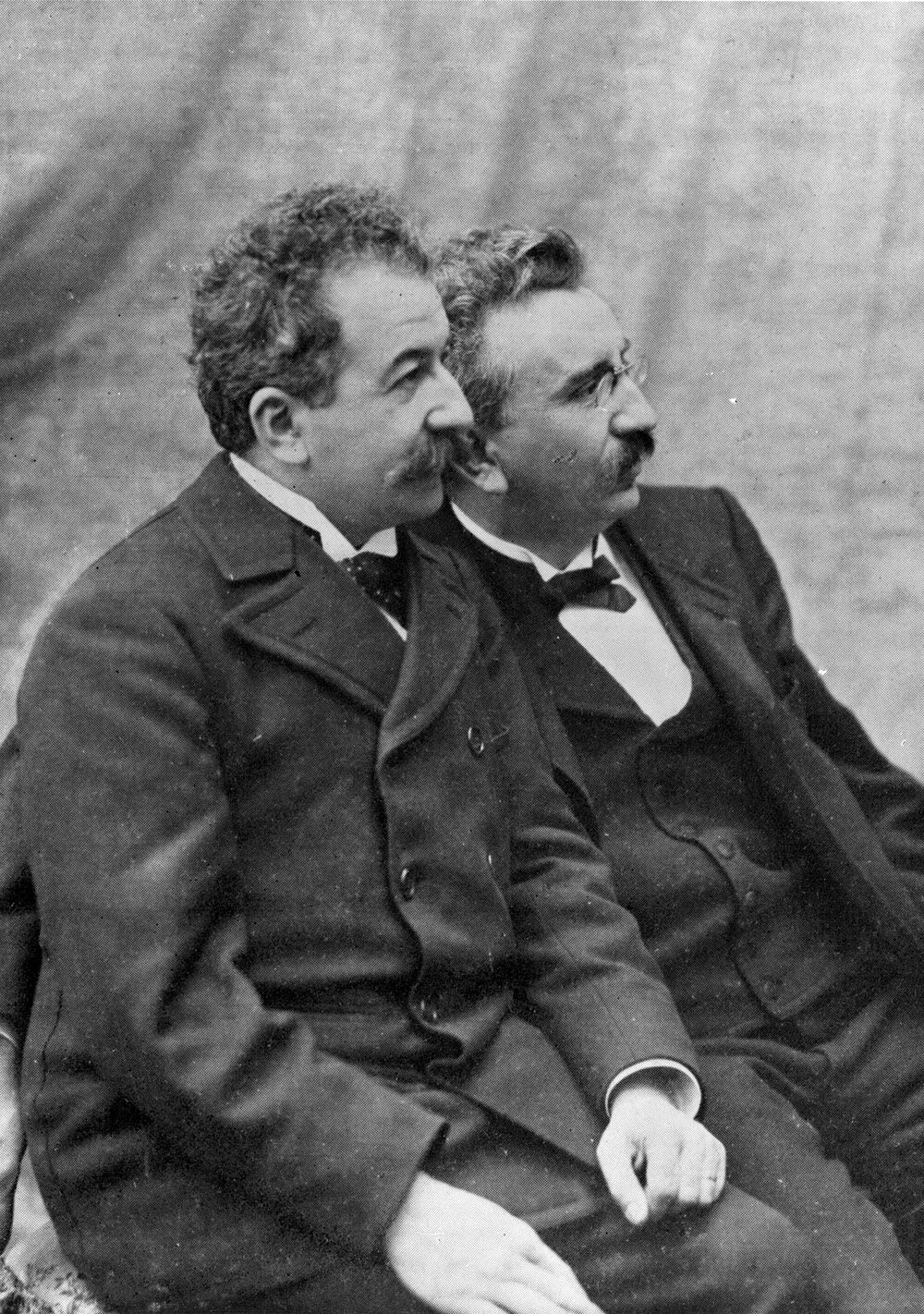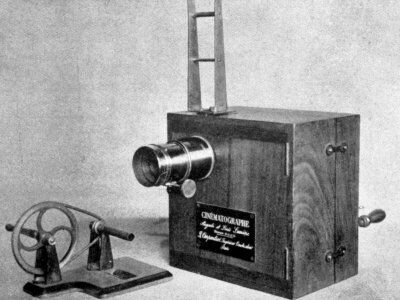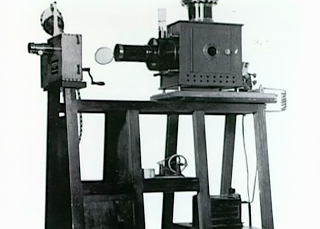Lumier brother invented a camera that was also a projector. i phone makes the possibility of camera that is also a screen accessible to most. these two things really tie together for me. the idea of the invention of the selfie coming when the camera flips to be able to see yourself while doing it, also coaligns with the invention of film - where the same camera that had taken the footage was also used as the projector for the moving image.
Lumier brothers
The fun fact about the Lumieres is that this invention is fucking cool.
the simplicity of this device uses the functionality of a basic camera - and camera obscura - wherever there is a small hole, pinprick etc with light on one side and darkness on the other, the lit side of the pinprick will be projected onto the darkness. the possibility of taking a record of that was already invented with the still camera, the Lumiere brothers worked in creating a camera that could take many images in quick succession, creating the illusion of movement. What is the kicker though, is that they invented the machine that could then play this recorded information back through the samehole through which it had captured the image in the first place. I just think that is just a really interesting moment of time where the inverse or reverse of the screen/camera becomes really important and people are finally able to watch ‘cinema’ not in individual, single viewings as had happened previously to this, but in groups of people, projected against a screen/wall so that people could watch these moving images illusion together.
what does this mean for the iPhone?
the camera flips into a mirror. there is no longer a time delay in seeing the image and posing for it. you can pose for the image as you are looking at the image - it develops into an intense self-scrutiny that you can see yourself as you are posing so you no longer pose freely. also the mirror loses its importance perhaps? now that we can see ourselves while taking the photo there is less of a need to look at ourselves in the mirror? or practice poses.
the pose and the selfie are really interesting topic - the pose changes dramatically when the camera becomes flipped. it is no longer looking at the camera lens, it is now looking at the screen. the body isnt freely moving, the body is tied to the device that takes its photo. in the selfie as art idea - the artist is now the model, the artist is tied to the device and the device bridges this gap between the artist and the model - the hand holding the device and the device itself are the bridges between artist and art, or artist and model.
in terms of artist - the artist now controls completely their image - there is no lag between, and no need for anthers eyes to see you in that moment and decide what looks good - you can see what looks good ongoingly. i was reading a book called 5 senses, and it made a really interesting point about the hands that is cutting its nails. at one point the hand is active and moving doing something to the other hand which lays impassively, receiving this nail did. but then the clippers are passed to the impassive hand - the victim hand and the process reverses. I feel there is some type of chain of thought within these ideas. the artist/hands makes the photo happen by pressing the camera button, but at the same time the artist is posing, ready for the shot to take a photo of them. its a passive and impassive moment that combines the artist with model making both impassive and both passive at the same time. or is it? at the time that the button clicks - you are simultaneously pressing and preening - your pose is already fixed and your hand desperately seeks for the button space, perhaps staying fixed in position and moving your eyes across slightly so that you can see the right button. its maybe a moment where both of these roles connect and hit each other with the sound of a camera click.
so in terms of female representation?
so the selfie means that as women we don’t have to rely on someone else being the bearer of the look, we are the bearer of the look. it doesn’t need another set of eye, another person to share this experience
The Berger stuff is really interesting to me - i think that the iPhone has become the new mirror - and all the old shit about vanity/narcism etc that underly all of the told nudes and female figure have now transferred to the selfie. the same argument is made, be it now on youtube comments and facebook walls. the same old shit.
WOAH - tangent?
It is really interesting thing to think of the importance of these two technological shifts in ways of viewing and ways of being an audience… maybe?
firstly, the shift of watching moving images individually, as a single experience (camera obscura, zoetrope etc) as a lone experience - this shift suddenly came about that people were able to watch the same image in a group of people. the moving image is no longer a lone experience, it is now a group experience.
now the shift of the selfie phone - the group or dual experience of taking a photo - the need for more than one person within this photo taking experience has changed to only needing one person - shift back into the lone experience of experience an image. although obviously people can still take group photos, but the need for one other person has gone.
what does this say about society ? well fuck, it was the beginning of growing collective conciousness, this group dynamic of the cinema is really important to our experience of cinema…. something… i think it changes from experiencing something ‘magical’ alone, with no one to gauge your experience against, to a shared lived experience…
selfie - but then it changes from having to rely, or ask someone to take a photo of you - the human interaction is disappearing and in its place is the online/digital interaction.
maybe the cinema brought people together in a shared, lived experience - and the selfie camera is taking the individual into a lonely place. so while it may be liberating, it also points the world in the direction of simulation and loneliness and individualism.




